
Introduction
The urgent and large-scale transition to sustainable production and consumption (SCP) systems across sectors and lifestyles requires the provision of timely and adapted solutions. Failing to utilise knowledge and solutions to improve and rebuild entire systems will irremediably push us towards a forced change. More than ever, priority needs to be given to fostering innovation and knowledge around sustainability and transmitting these learnings clearly and effectively.
Knowledge institutions (KIs) play a leading role in generating and supplying knowledge, assessing and monitoring policy progress, and putting forward scalable solutions. They are central actors in preparing for and overcoming complex crises. They are also often the starting point for innovative adaptations in the ways in which we think and talk as societies about present and future crises and how we can better ensure that our planning and responses leave no one behind.
KIs come in many forms, from research institutes, universities and reference libraries, to government units, private research and development divisions, and third sector think (and do) tanks. Their work ranges across scales from hyper-local and local studies, pilot projects and collaborations, to national policy analyses, capacity building, and global systems and policy analyses. Their outputs encompass products from the academic sphere (e.g. theory and research papers) to the analytical (e.g. case studies, market and policy analyses) and practical (pilot projects, resources for capacity building and communication).
Knowledge institutions boast a wide range of connections to the constellation of actors working on SCP. Indeed, KIs are often arranged as part of national and global networks of learning and knowledge transmission. These networks share knowledge across actors and scales, helping to ensure that information and analysis (as well as capacity support) flows to those practitioners who can implement it effectively. Broadly speaking, networks can be categorised into three types, each acting to support a different array of practitioners in the SCP sphere. First are the networks consisting of academic institutions, departments, think tanks, and individual researchers. Second are the networks of upscalers, operating closer to the ground and comprising innovators and entrepreneurs, think and do tanks, and a wide range of actors embedded in business schools, incubators and civil society organisations. Finally, there are networks of governments, ministries, bureaucratic units, international organisations and policy-focused think tanks. All these types of networks are in complex interplay with each other.
This paper is a reflection of the discussions transpired at the webinar entitled Innovation and SCP: The Role of Knowledge Institutions was organised by the SWITCH-Asia SCP facility on 28 October 2022. The document was also informed by knowledge of the authors and by research undertaken in a course of preparation for the webinar. The event convened sustainability experts from academia, international research institutes, and the business sector. Panellists had a fruitful discussion to identify the best role that KIs can play to support the building of innovation ecosystems. The discussion centred around three key thematic areas:
- Knowledge Generation
- Scaling SCP Innovations
- Supporting SCP Policy Formation
Through the expert discussion, a set of key questions emerged, some of which were unexpected or surprising, suggesting that there are areas of opportunity beyond the standard approaches. This set of questions can loosely be grouped under the following five headings:
- How do KIs mobilise and draw on scientific and technical knowledge to propose innovative solutions leaving no one behind?
- How can we better communicate SCP knowledge with public and private stakeholders?
- How can we improve the scaling of SCP knowledge?
- What is the role of networks in supporting knowledge transfer and value creation?
- How can KIs encourage the development of supportive SCP policy environments?
Four speakers and one moderator joined the session:

How do knowledge institutions mobilise and draw on scientific and technical knowledge to propose innovative solutions?
Co-designing research questions and solutions with local actors
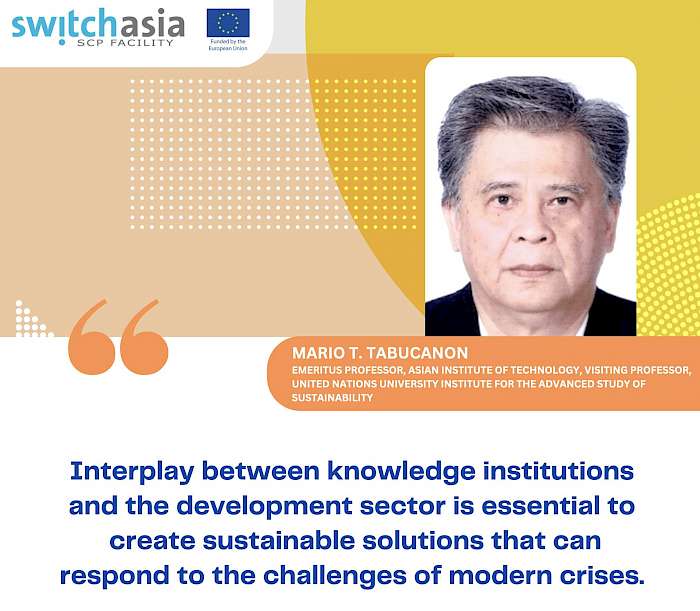 KIs play a crucial role in developing and offering solutions benefiting all. Leaving no one behind when proposing and implementing solutions requires the constant inclusion of local communities and minorities throughout research processes. Initial research questions should be co-designed with local stakeholders to ensure their inclusion throughout the development of solutions. The discussion highlighted the importance of fully understanding social contexts and perspectives of all stakeholders, including governments and businesses. Conducting research on social aspects in parallel to technical elements will ensure that the produced research considers potential behavioural barriers. While having a systemic understanding of the political economy is instrumental in indicating the need to shift to a new sustainable paradigm, understanding social barriers and drivers in leading behavioural change will enable wide shifts towards SCP. As such, gathering information on behaviours (and, where possible, with) local communities and various contexts is key to driving the agenda further. For example, projects to implement decarbonisation practices in citizens’ lifestyles revealed stark disparities in available opportunities between urban and rural areas in Japan. Residents of rural areas were faced with obstacles in adopting decarbonisation options in transportation due to the lack of available public transportation. This situation is disproportionately affecting the growing population of senior citizens who are no longer able to use their cars. As such, SCP research should constantly reflect changing needs and behaviours to adapt policy recommendations.
KIs play a crucial role in developing and offering solutions benefiting all. Leaving no one behind when proposing and implementing solutions requires the constant inclusion of local communities and minorities throughout research processes. Initial research questions should be co-designed with local stakeholders to ensure their inclusion throughout the development of solutions. The discussion highlighted the importance of fully understanding social contexts and perspectives of all stakeholders, including governments and businesses. Conducting research on social aspects in parallel to technical elements will ensure that the produced research considers potential behavioural barriers. While having a systemic understanding of the political economy is instrumental in indicating the need to shift to a new sustainable paradigm, understanding social barriers and drivers in leading behavioural change will enable wide shifts towards SCP. As such, gathering information on behaviours (and, where possible, with) local communities and various contexts is key to driving the agenda further. For example, projects to implement decarbonisation practices in citizens’ lifestyles revealed stark disparities in available opportunities between urban and rural areas in Japan. Residents of rural areas were faced with obstacles in adopting decarbonisation options in transportation due to the lack of available public transportation. This situation is disproportionately affecting the growing population of senior citizens who are no longer able to use their cars. As such, SCP research should constantly reflect changing needs and behaviours to adapt policy recommendations.
Adopting a multidisciplinary and multisectoral approach to knowledge generation
In order to address problems from a holistic point of view, KIs draw tools and solutions from traditionally siloed disciplines, combining formal and informal sources. The panel discussion presented several cases of data collection conducted on the ground. Initial behavioural observations were made in hotel kitchens to lead quantitative data collection on food wastage generation. Evidence on the food waste produced in the hospitality sectors can then be connected to broader issues of food sovereignty and food security. Zooming out from observations made on the ground allows us to compare and integrate results with global studies to draw broader conclusions and develop adapted solutions. Knowledge gathered on local needs can be linked to complex global issues.
Translating research-based knowledge into practical actions
Innovative solutions put forward by KIs are piloted on the ground to further assess their impacts before dissemination. It was revealed that piloting solutions demonstrates both the expected and unexpected impacts of their implementation in various contexts. Drawing lessons from multiple cases of trial and error is key to developing and identifying the best alternatives to the current status quo. The implementation of the Pledge on Food Waste by LightBlue Environmental Consulting in Mauritius provides a concrete example of piloting a model to track and reduce food waste and its associated costs in the hospitality sector. Following a period of training, the food waste monitoring technology FIT (Food Intel Tech) was piloted over 6 months in 8 hotels and 2 corporate canteens. The tool enables food practitioners to easily measure their generated food waste to identify and track their sources. The measured impacts offered instrumental evidence for the projected reductions in food wastage, carbon emissions, and costs. Information gathered from pilots is then crucial to building trust among stakeholders and larger networks ahead of scaling the monitoring methodology. While developing innovative solutions is often put forward to enact large-scale systemic change, the importance of identifying existing good practices to be upscaled or adapted was recognised.
Building models and tools to map and monitor future impacts
Based on collected data and developed theories, KIs also build tools and models to predict and evaluate the impacts of implementing solutions. Among other monitoring and projection tools, SEI developed the Water Evaluation and Planning system (WEAP), and the Low Emissions Analysis Platform (LEAP) for long-term planning. Such tools serve as essential references in policymaking for governments to assess different alternatives based on the expected costs and impacts of shifts to sustainable systems. Ensuring that developed tools are flexible and intuitive will encourage their usage by a wide variety of stakeholders, from global policy experts to educators wanting to build capacity on SCP, and young analysts starting their journey to understanding complex sustainability issues.
How can we better communicate SCP knowledge with public and private stakeholders?
Leveraging education opportunities
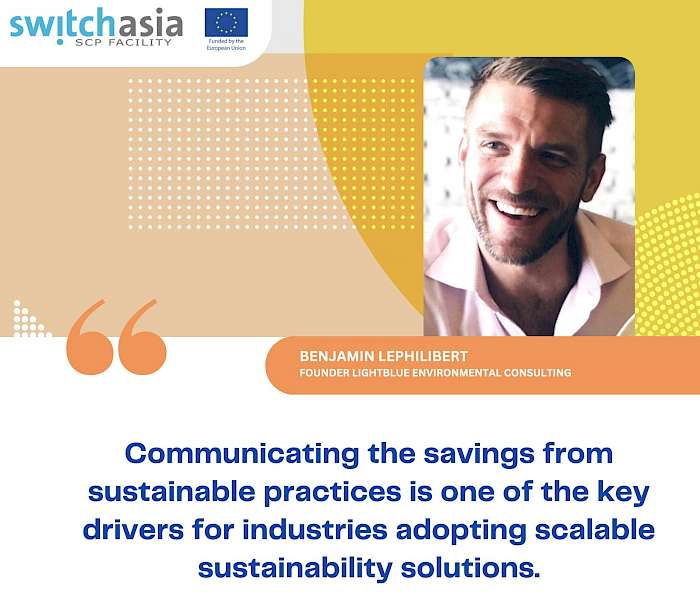 KIs also participate in transferring knowledge by creating learning materials to be widely disseminated across sectors. The Joint Master of Science in Food Security and Climate Change (MS FSCC) was designed to develop and train the next generation of interdisciplinary professionals to help address climate change and food security challenges facing Southeast Asia. Since 2016, over 100 students were trained in 15 partner universities. Students participated in exchanges in Southeast Asia and Europe, summer schools abroad, and joint research with partner institutions. Despite restrictions brought by the COVID-19 pandemic, the implementation of this dual degree fulfilled its objectives to provide a holistic education on climate and food issues while contributing to the internationalisation of participating High Education Institutes and reinforcing their network.
KIs also participate in transferring knowledge by creating learning materials to be widely disseminated across sectors. The Joint Master of Science in Food Security and Climate Change (MS FSCC) was designed to develop and train the next generation of interdisciplinary professionals to help address climate change and food security challenges facing Southeast Asia. Since 2016, over 100 students were trained in 15 partner universities. Students participated in exchanges in Southeast Asia and Europe, summer schools abroad, and joint research with partner institutions. Despite restrictions brought by the COVID-19 pandemic, the implementation of this dual degree fulfilled its objectives to provide a holistic education on climate and food issues while contributing to the internationalisation of participating High Education Institutes and reinforcing their network.
Learning materials are also addressed to train professionals to adopt new sustainable practices. LightBlue Environmental Consulting created an online master class to build capacity on food waste reduction methods among food professionals. The online modules trained food professionals by providing them with definitions of food loss and food waste, knowledge on the impacts of food loss and waste across food supply chains, and data collection methodologies. At the end of the training, participants were offered a professional certification and the opportunity to integrate the FIT tool in their processes. As such, transferring knowledge to relevant stakeholders is crucial to adapt operations and promote the various benefits (financial, associated with proposed adjustments.
Learning to communicate knowledge
A core challenge lies in effectively communicating the complex nature of sustainability issues to the wider public and relevant stakeholders. Experts identified a prominent gap between those creating knowledge and people not involved in sustainability. This challenge stems from increasing disinformation and the general separation of research from the practicalities of life. In order to increase engagement with those left behind, a measured approach should be adopted when communicating with the larger public. Rather than having a top-down approach to knowledge sharing, it was acknowledged that the audience should be primary in science communication.
The discussion also evidenced the lack of good communicators and activist figures among SCP policy experts. As a result, it was argued that knowledge professionals should be trained to develop their communication skills and convey the right message to resonate with the audience. Researchers should focus not only on their research details but also on going out and marketing their research. However, it was further acknowledged that engaging the wider public should not hinder research and development efforts.
Nevertheless, researchers should expand the way they communicate their research results and accumulated knowledge. As traditional ways to communicate knowledge such as peer-reviewed papers are increasingly seen as obsolete, KIs are developing new ways to communicate in a timely and broad manner through infographics, models and scenarios, data visualisation, videos and podcasts. The discussion emphasised the need to consider the whole range of communication strategies to engage stakeholders. Complex issues and situations should be broken down into more understandable bite-size and easy-to-digest materials to reach a larger public. This will also enable a more targeted approach to policy dialogue and policy discussions.
How can we improve the scaling of SCP knowledge?
Multiple pathways to scaling good practices
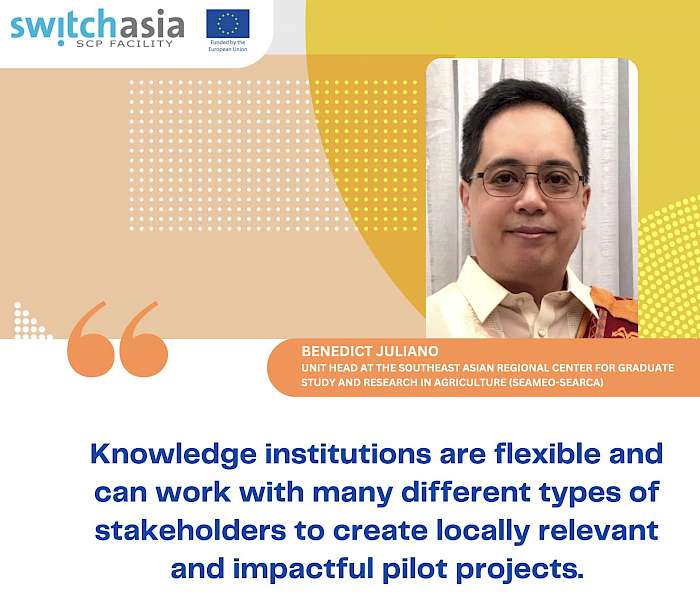 Scaling up is often referred to as multiplying good practices at the national, regional and global levels. Knowledge can be transferred through learning materials distributed across formal knowledge networks to ensure their wide application. Good practices should be translated and transmitted to be amplified across networks and regions. Rather than solely duplicating solutions, KIs’ credibility allows their work to be disseminated and boosted through partnerships and networks. Over the long term, trust is built towards the information being shared to ensure wide application. Academic networks such as Prosper.net can be used to develop a curriculum on sustainability to be piloted and upscaled to the rest of the network. The Regional Centres of Expertise (RCEs) on Education for Sustainable Development (ESD) comprise a global multi-stakeholder network translating global objectives into the context of local communities in which they operate. Inversely, the importance of scaling deep was also highlighted to ensure that no one is left behind. Scaling deep is about tying the research work with community-level needs and desires, opportunities, as well as cultural and ethnic contexts. By zooming in, knowledge can be connected to the local and microscopic levels. Innovative solutions proposed by KIs have to be adapted to local realities. Knowledge domestication should bring local expertise to translate proposed ideas and concepts into local practices. For example, the School-Plus-Home-Garden Project (S+HGP) which was piloted in six schools in the province of Laguna, adopted an innovative approach to home gardening by focusing on safe food preparation, education, economic well-being and sustainable agriculture. Faced with communities’ reluctance to consume some of the harvested vegetables, the model was adapted to tap into community knowledge to plant vegetables according to local needs. This reflects the necessity to identify the voices that are not heard in policy discussions in order to solve bigger issues. This will encourage local actors to further understand and play a part in shaping a better future for their local society.
Scaling up is often referred to as multiplying good practices at the national, regional and global levels. Knowledge can be transferred through learning materials distributed across formal knowledge networks to ensure their wide application. Good practices should be translated and transmitted to be amplified across networks and regions. Rather than solely duplicating solutions, KIs’ credibility allows their work to be disseminated and boosted through partnerships and networks. Over the long term, trust is built towards the information being shared to ensure wide application. Academic networks such as Prosper.net can be used to develop a curriculum on sustainability to be piloted and upscaled to the rest of the network. The Regional Centres of Expertise (RCEs) on Education for Sustainable Development (ESD) comprise a global multi-stakeholder network translating global objectives into the context of local communities in which they operate. Inversely, the importance of scaling deep was also highlighted to ensure that no one is left behind. Scaling deep is about tying the research work with community-level needs and desires, opportunities, as well as cultural and ethnic contexts. By zooming in, knowledge can be connected to the local and microscopic levels. Innovative solutions proposed by KIs have to be adapted to local realities. Knowledge domestication should bring local expertise to translate proposed ideas and concepts into local practices. For example, the School-Plus-Home-Garden Project (S+HGP) which was piloted in six schools in the province of Laguna, adopted an innovative approach to home gardening by focusing on safe food preparation, education, economic well-being and sustainable agriculture. Faced with communities’ reluctance to consume some of the harvested vegetables, the model was adapted to tap into community knowledge to plant vegetables according to local needs. This reflects the necessity to identify the voices that are not heard in policy discussions in order to solve bigger issues. This will encourage local actors to further understand and play a part in shaping a better future for their local society.
Open and transparent data
The panellists stressed the importance of openly available data and transparency in conducting research. Making data around the methodologies openly available is essential to aggregate several sources of information and show the validity of the collected data. It was emphasised that transparency is critical to building trust and identifying priorities for action to implement alternative processes. SEARCA’s Open-Source Tractor Development in the Philippines ensured knowledge transfer on the transition from manual agriculture to a more cost-effective, sustainable and scalable mechanised agriculture. Blueprints to build tractors from parts could be acquired online without tie-ins to allow a fast and wide transfer of skills. Ensuring that data is visible to all is also instrumental to signal the remaining gaps in SCP to both businesses and consumers. SEI’s data-driven transparency initiative called Trase makes visible the supply chain dynamics of main commodities such as soy, meat and timber from around the world. While a lack of data should not hinder action, continuously generating data while ensuring its transparency will accelerate progress towards more sustainable trade and development.
What is the role of networks in supporting knowledge transfer and value creation?
Leveraging networks of upscalers
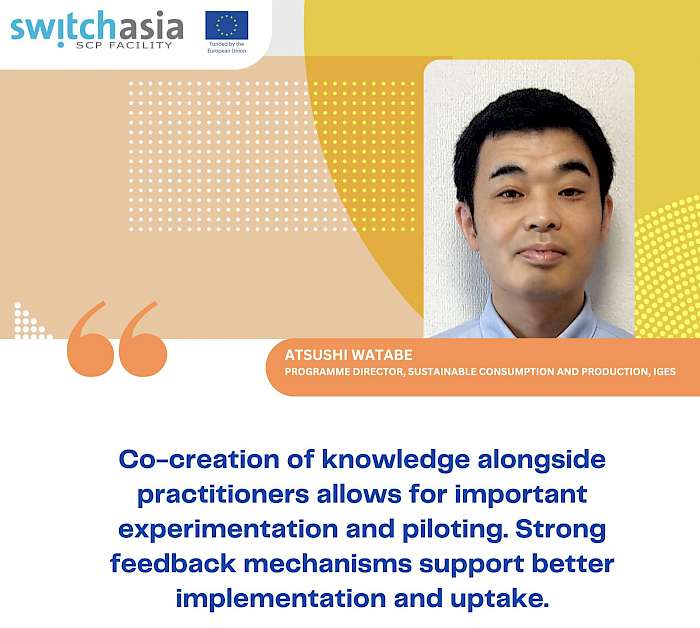 The importance of maintaining a diversity of networks was emphasised as a way to better target pathways to scale up sustainable solutions. Networks of upscalers comprise innovators and entrepreneurs, think and do tanks, and a wide range of actors embedded in business schools, incubators and civil society organisations. Engaging with large networks allows seeking from a wider pool of resources and valuable expertise to scale projects. Building ties with academic and private stakeholders is key to building knowledge and guiding businesses towards remaining gaps to measure and address issues. Business forums play a key role in supporting businesses by making knowledge widely accessible. Large business networks are necessary to make sure that a niche market is not being created. As an example, Sumernet is a research network of 500 researchers to share research outputs and develop policy dialogue and capacity. It scales research so that it reaches more people across sectors.
The importance of maintaining a diversity of networks was emphasised as a way to better target pathways to scale up sustainable solutions. Networks of upscalers comprise innovators and entrepreneurs, think and do tanks, and a wide range of actors embedded in business schools, incubators and civil society organisations. Engaging with large networks allows seeking from a wider pool of resources and valuable expertise to scale projects. Building ties with academic and private stakeholders is key to building knowledge and guiding businesses towards remaining gaps to measure and address issues. Business forums play a key role in supporting businesses by making knowledge widely accessible. Large business networks are necessary to make sure that a niche market is not being created. As an example, Sumernet is a research network of 500 researchers to share research outputs and develop policy dialogue and capacity. It scales research so that it reaches more people across sectors.
Maintaining close contact with networks of decision-makers
The discussion stressed the importance of forming and developing wide networks within and across levels of government, including ministries, bureaucratic units, international organisations and policy-focused think tanks, to enact change in policies and on the ground. Maintaining close and constant contact with various networks of decision-makers and social actors is instrumental to know and identify the best actors to target. Niche points to push and enact larger and more impactful change can be identified through such networks. For example, working with one big supermarket instead of thousands of individual fishermen will be more efficient. The role of international organisations in providing valuable networks for knowledge exchange should be acknowledged.
How can knowledge institutions encourage the development of supportive SCP policy environments?
Influencing policymaking
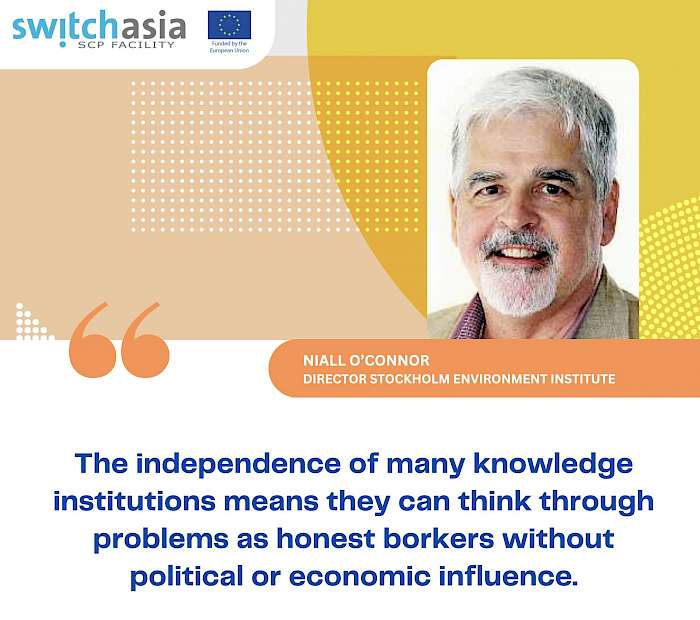 The provision of expertise on specific issues helps policymakers weigh national, regional and global risks as they plan and assess their development strategies. Scientists traditionally support policymaking by showing evidence and presenting the most appropriate policies based on science. Lessons learnt from piloting projects are directed towards policymaking. This was observed with the Prosper.net programme and the School-Plus-Home-Garden Project (S+HGP) from which developed materials were reflected into national curriculums and policymaking in education. Knowledge institutions also support policy dialogue by developing policy strategies and instruments to implement sustainable solutions. Another key role of KIs is to continuously evaluate the progress and impact of the policy. The traditional way for KIs to support policymaking by recommending sector-specific policy changes is now outdated as rethinking and rebuilding entire systems is urgently needed. Moreover, solving individual problems is insufficient to obtain a clear view of opportunities and challenges of available options.
The provision of expertise on specific issues helps policymakers weigh national, regional and global risks as they plan and assess their development strategies. Scientists traditionally support policymaking by showing evidence and presenting the most appropriate policies based on science. Lessons learnt from piloting projects are directed towards policymaking. This was observed with the Prosper.net programme and the School-Plus-Home-Garden Project (S+HGP) from which developed materials were reflected into national curriculums and policymaking in education. Knowledge institutions also support policy dialogue by developing policy strategies and instruments to implement sustainable solutions. Another key role of KIs is to continuously evaluate the progress and impact of the policy. The traditional way for KIs to support policymaking by recommending sector-specific policy changes is now outdated as rethinking and rebuilding entire systems is urgently needed. Moreover, solving individual problems is insufficient to obtain a clear view of opportunities and challenges of available options.
Supporting social actors leading change
Knowledge institutions should not just support policymakers but should also support businesses, incubators and investors who play a crucial role in the sustainability transition. Policies supported by KIs should also facilitate and encourage social entrepreneurs to embark on new trials to provide alternative services to society. Tangible positive impacts and lessons can be drawn from social businesses. We can then generate knowledge on what insights can be drawn from unexpected results and progress.
Reporting unexpected results
When communicating results to funders and policymakers, KIs mostly focus on achievements and exclude many of the challenges encountered. This is generally seen as a necessary practice to maintain or increase funding but it also deprives partners and society of meaningful implementation. Reporting of unexpected results, often in seemingly unrelated areas, can give policymakers a better understanding of the business and social environment. In order to determine the best alternatives to the status quo, it is crucial to take an experimental, iterative approach that incorporate co-generation, and a mode of constant learning. KIs can identify areas where such trial and error approaches are most needed, and support policymakers by sharing the unexpected results of pilot implementations to plan better ways of providing mobility, energy and other essential services.
Conclusion
Knowledge institutions play an important role in driving the sustainability transition by generating and transferring essential information to key stakeholders, as well as connecting with relevant actors to apply and scale solutions on the ground. Interestingly, the panel of experts observed a shift in the ways in which knowledge is produced from a one-way model to the co-production of knowledge with a large variety of partners to best tailor to changing and varying necessities. This shift implies a new role for the wider society and relevant stakeholders in the collective research and learning processes needed to transition to patterns of SCP. As such, while the traditional role of knowledge institutions has focused on generating knowledge in-house and then transferring the knowledge to stakeholders, there are increasing opportunities for KIs to play a strong role in co-generating knowledge and actions with partners on the ground to bridge the gap between science and society/policy. This approach necessarily shifts stakeholders from passive recipients of knowledge to active partners in the identification of research questions, experimental design, and project implementation and monitoring.
In order to translate knowledge from conceptual to practical, effective partnerships are needed to pilot and co-create initiatives that respond in real time to on-the-ground conditions. This style of collaboration helps to ensure that policy development takes an iterative approach, welcoming feedback and new knowledge in the pursuit of ever-better implementation. It also requires a deeper understanding of the stakeholders involved what motivates them, what their values are, and what their vision is for the future. Knowledge institutions are ideally equipped to engage in this type of work, supporting initiative and policy efforts with analytical rigor.
Finally, as an unexpected outcome of the panel, the discussion revealed that there is a real hunger for improving the communication capacity of knowledge institutions. Indeed, it has often been noted that communications around SCP are often opaque and confusing to governments, business and consumers alike, and yet when communication is done right, it is game-changing for knowledge uptake and behaviour change. As such, the panel agreed that efforts should be made to build general capacity for effective communication across KI stakeholders. A closely associated upgrade is needed for communication channels to enable smooth dissemination of knowledge, which must be diversified so that it resonates with larger audiences and a wider range of stakeholders.
Acknowledgment
This article was written by Alice Yamabe and Dwayne Appleby, Institute for Global Environmental Strategies (IGES) in coordination with Zinaida Fadeeva, SWITCH-Asia SCP Facility. It was produced within the context of the organisation of the webinar entitled Innovation and SCP: The Role of Knowledge Institutions that took place on 28 October 2022 and which brought together Asian and global sustainability experts from academia, international research institutes, and the business sector to identify the best role that KIs can play to support the building of innovation ecosystems.



